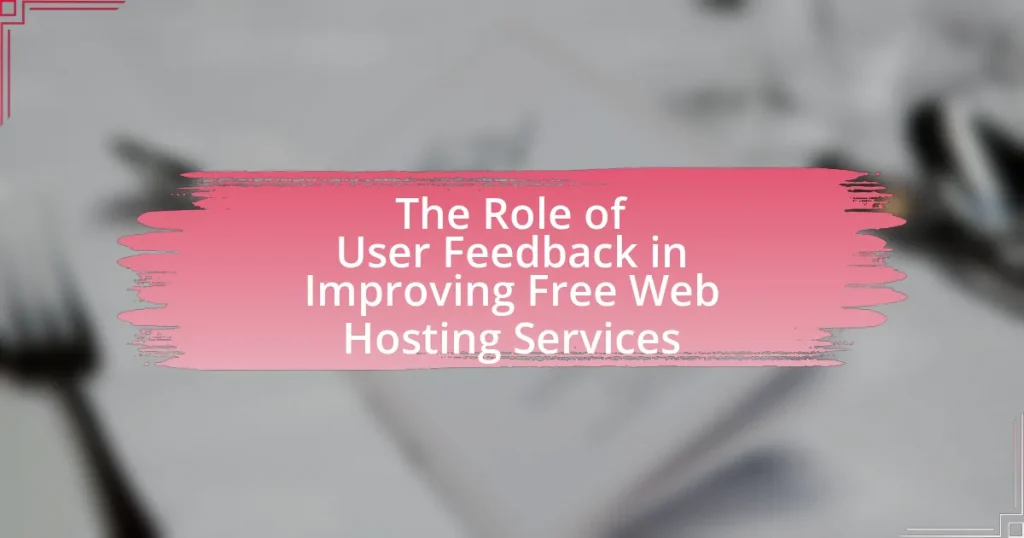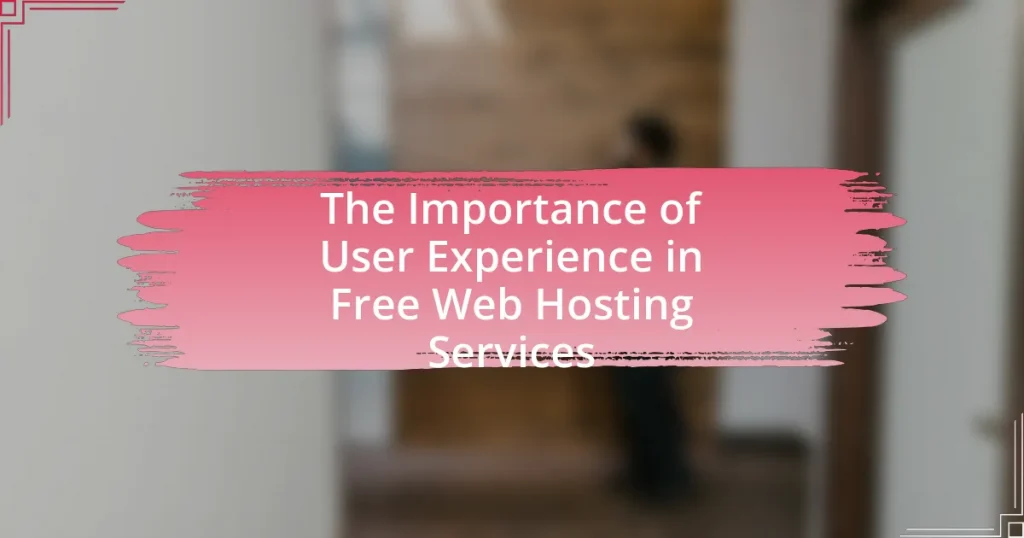The article addresses common misconceptions about security in free web hosting services, highlighting the belief that these platforms offer adequate security comparable to paid options. It discusses the inherent risks associated with free hosting, such as data breaches and malware infections, primarily due to limited resources and shared server environments. The article also contrasts the security measures of free and paid hosting, emphasizing the lack of robust protections in free services, and outlines best practices users can adopt to enhance their security. Additionally, it provides insights into how users can assess the reliability of free web hosting security and identify signs of potential breaches.
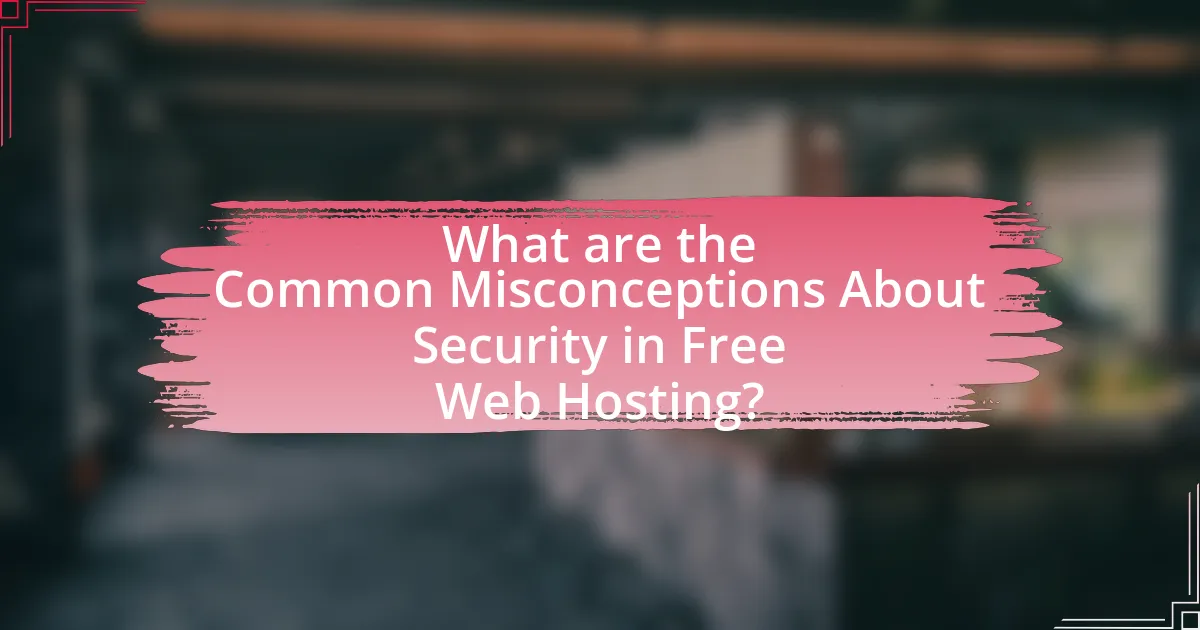
What are the Common Misconceptions About Security in Free Web Hosting?
Common misconceptions about security in free web hosting include the belief that free services provide adequate security measures comparable to paid options. Many users assume that free web hosting platforms implement robust security protocols, but in reality, they often lack essential features such as regular updates, advanced encryption, and dedicated support. For instance, a study by the Cybersecurity & Infrastructure Security Agency (CISA) highlights that free hosting services frequently experience higher rates of security breaches due to insufficient resources allocated for security. Additionally, users often underestimate the risks of shared hosting environments, where multiple websites share the same server, increasing vulnerability to attacks.
Why do people believe that free web hosting is insecure?
People believe that free web hosting is insecure primarily due to the lack of robust security measures and support typically associated with paid services. Free hosting providers often have limited resources, which can result in inadequate protection against threats such as hacking, malware, and data breaches. Additionally, many free hosting platforms monetize their services through ads or by selling user data, raising concerns about privacy and data integrity. Studies have shown that free hosting services are more frequently targeted by cybercriminals, further reinforcing the perception of insecurity among users.
What specific security risks are associated with free web hosting?
Free web hosting poses several specific security risks, including data breaches, malware infections, and lack of support for security updates. Users of free hosting services often share server resources, which increases vulnerability to attacks such as cross-site scripting and SQL injection. Additionally, many free hosting providers do not implement robust security measures, leaving websites exposed to potential threats. According to a study by the Cybersecurity & Infrastructure Security Agency, shared hosting environments are particularly susceptible to attacks due to inadequate isolation between users. Furthermore, the absence of regular security updates can lead to outdated software, making sites more prone to exploitation.
How do perceptions of security differ between free and paid hosting services?
Perceptions of security differ significantly between free and paid hosting services, with many users believing that paid services offer superior security features. This belief stems from the fact that paid hosting often includes dedicated security measures such as SSL certificates, regular backups, and advanced firewalls, which are less common in free hosting options. Additionally, a survey by HostingAdvice found that 70% of users associate paid hosting with better customer support and security protocols, reinforcing the notion that investment correlates with enhanced protection against cyber threats.
What are the actual security measures in place for free web hosting?
Free web hosting services typically implement basic security measures such as firewalls, SSL certificates, and regular software updates. Firewalls help protect against unauthorized access, while SSL certificates encrypt data transmitted between the user and the server, enhancing privacy. Regular software updates are crucial for patching vulnerabilities and ensuring that the hosting environment remains secure. However, the level of security can vary significantly among providers, and many free services may lack advanced features like DDoS protection or comprehensive malware scanning, which are more common in paid hosting plans.
How do free web hosting providers implement security protocols?
Free web hosting providers implement security protocols primarily through shared security measures, such as firewalls, SSL certificates, and regular software updates. These providers often utilize centralized security systems that monitor and protect multiple users on the same server, ensuring that vulnerabilities are addressed collectively. For instance, many free hosting services deploy firewalls to filter out malicious traffic and prevent unauthorized access. Additionally, they may offer SSL certificates to encrypt data transmitted between users and the server, enhancing data security. Regular updates to server software and applications are also crucial, as they patch known vulnerabilities and reduce the risk of exploitation. These practices collectively contribute to a baseline level of security, although they may not match the comprehensive protections found in paid hosting services.
What types of encryption and data protection are commonly used?
Commonly used types of encryption and data protection include symmetric encryption, asymmetric encryption, and hashing. Symmetric encryption, such as AES (Advanced Encryption Standard), uses the same key for both encryption and decryption, making it efficient for large data sets. Asymmetric encryption, exemplified by RSA (Rivest-Shamir-Adleman), employs a pair of keys—public and private—for secure data exchange, enhancing security in communications. Hashing algorithms like SHA-256 (Secure Hash Algorithm) convert data into a fixed-size string of characters, providing data integrity by ensuring that any alteration in the original data results in a different hash value. These methods are foundational in securing data across various platforms, including free web hosting services, where misconceptions about security often arise.
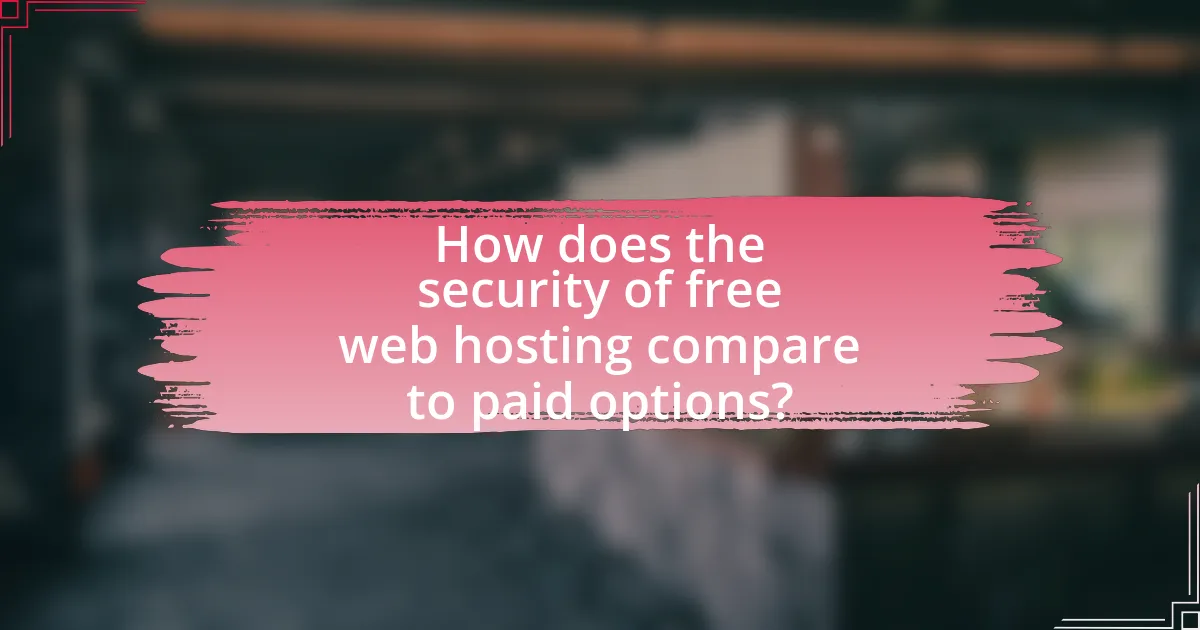
How does the security of free web hosting compare to paid options?
The security of free web hosting is generally lower than that of paid options. Free web hosting services often lack robust security measures, such as regular updates, dedicated support, and advanced encryption, which are typically provided by paid services. For instance, a study by the Cybersecurity & Infrastructure Security Agency (CISA) indicates that free hosting platforms are more susceptible to malware and hacking due to their limited resources and lack of professional oversight. In contrast, paid hosting services invest in security protocols, including firewalls and intrusion detection systems, which significantly enhance the protection of user data and websites.
What are the key differences in security features between free and paid hosting?
Free hosting typically offers limited security features compared to paid hosting. Paid hosting services often include advanced security measures such as SSL certificates, regular backups, firewalls, and malware scanning, which are essential for protecting sensitive data and maintaining website integrity. In contrast, free hosting may lack these features, exposing users to higher risks of data breaches and cyberattacks. For instance, a study by the Cybersecurity & Infrastructure Security Agency (CISA) indicates that websites without SSL certificates are significantly more vulnerable to interception and data theft. Thus, the key differences lie in the comprehensive security protocols and support provided by paid hosting versus the minimal protections available in free hosting options.
How do customer support and incident response differ in free versus paid hosting?
Customer support and incident response in free hosting typically offer limited resources and slower response times compared to paid hosting, which provides dedicated support and faster incident resolution. Free hosting services often rely on community forums or automated responses, resulting in less personalized assistance, while paid hosting usually includes 24/7 access to trained support staff, ensuring quicker and more effective handling of issues. For instance, a study by HostingAdvice found that 70% of users on free hosting platforms reported dissatisfaction with support response times, whereas 90% of paid hosting users rated their support as satisfactory or excellent.
What are the implications of using shared resources in free hosting environments?
Using shared resources in free hosting environments can lead to significant security vulnerabilities and performance issues. The primary implication is that multiple users share the same server resources, which increases the risk of data breaches, as one compromised account can potentially expose others. Additionally, performance can degrade due to resource contention, where high traffic from one site affects the loading speed of others. Research indicates that 60% of free hosting services do not implement adequate security measures, making them susceptible to attacks such as cross-site scripting and SQL injection. This lack of isolation among users further exacerbates the risks associated with shared resources in these environments.
Are there any misconceptions about the reliability of free web hosting security?
Yes, there are misconceptions about the reliability of free web hosting security. Many users believe that free web hosting services provide adequate security measures comparable to paid options, but this is often not the case. Research indicates that free hosting platforms typically lack robust security features such as regular updates, advanced encryption, and dedicated support, making them more vulnerable to cyber threats. For instance, a study by the Cybersecurity & Infrastructure Security Agency (CISA) highlights that free hosting services are frequently targeted by hackers due to their weaker security protocols.
What factors contribute to the perceived reliability of free web hosting?
The perceived reliability of free web hosting is influenced by factors such as uptime guarantees, user reviews, support availability, and the reputation of the hosting provider. Uptime guarantees, often stated as a percentage, indicate the expected operational time of the service; for example, a 99.9% uptime guarantee suggests minimal downtime, which enhances reliability perception. User reviews provide firsthand experiences that can validate or undermine the reliability claims made by the provider. Support availability, including response times and assistance quality, directly impacts user confidence in the service. Lastly, the reputation of the hosting provider, often built over time through consistent performance and customer satisfaction, plays a crucial role in shaping perceptions of reliability.
How can users assess the security reliability of a free web hosting service?
Users can assess the security reliability of a free web hosting service by evaluating its security features, user reviews, and compliance with industry standards. Key security features to look for include SSL certificates, regular backups, and malware scanning. User reviews often provide insights into the service’s reliability and any past security incidents. Additionally, checking for compliance with standards such as GDPR or PCI-DSS can indicate a commitment to security. For example, a study by the Ponemon Institute found that organizations adhering to compliance standards experience fewer data breaches, highlighting the importance of such certifications in assessing security reliability.
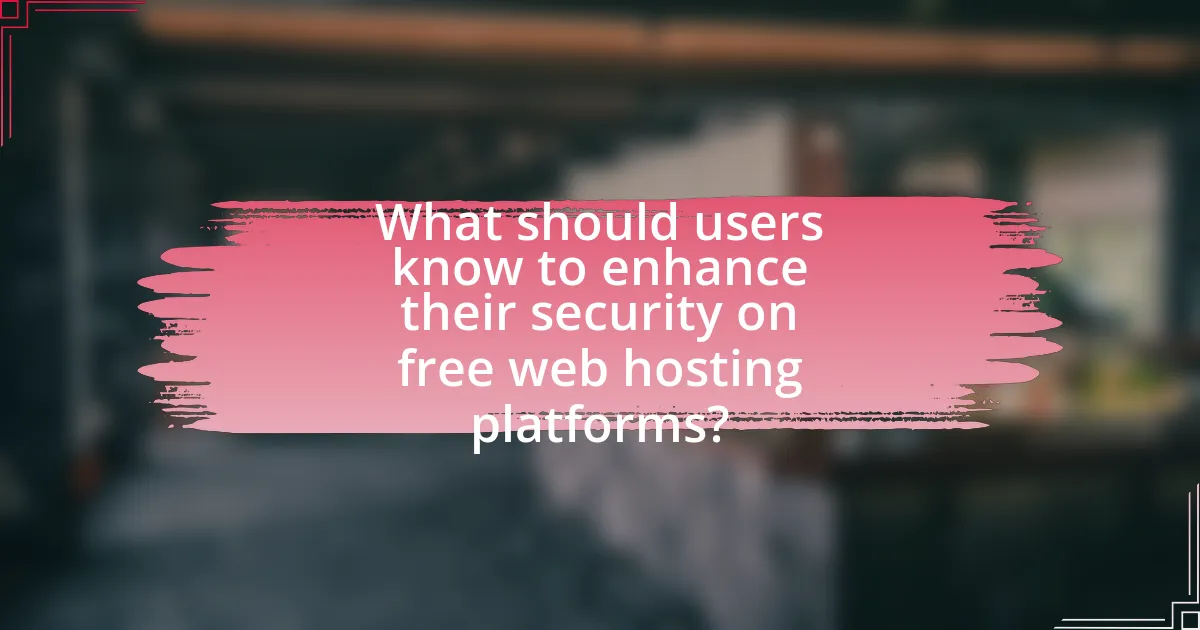
What should users know to enhance their security on free web hosting platforms?
Users should know that enhancing security on free web hosting platforms requires implementing strong passwords, regularly updating software, and utilizing HTTPS. Strong passwords reduce the risk of unauthorized access, as studies show that 81% of data breaches are linked to weak passwords. Regular software updates patch vulnerabilities, which is crucial since 60% of breaches involve known vulnerabilities. Utilizing HTTPS encrypts data transmitted between the user and the server, protecting sensitive information from interception. By following these practices, users can significantly improve their security on free web hosting platforms.
What best practices can users follow to secure their free web hosting accounts?
To secure free web hosting accounts, users should implement strong, unique passwords and enable two-factor authentication (2FA) whenever possible. Strong passwords reduce the risk of unauthorized access, while 2FA adds an additional layer of security by requiring a second form of verification. According to a 2020 report by Verizon, 81% of data breaches are linked to weak or stolen passwords, highlighting the importance of robust password practices. Additionally, users should regularly update their software and plugins to patch vulnerabilities, as outdated systems are prime targets for attacks. Regular backups of website data also ensure that users can recover quickly from potential breaches or data loss.
How can users create strong passwords and manage access controls?
Users can create strong passwords by using a combination of upper and lower case letters, numbers, and special characters, ensuring that the password is at least 12 characters long. This complexity makes it significantly harder for attackers to guess or crack passwords; for instance, a study by the National Institute of Standards and Technology (NIST) indicates that longer passwords exponentially increase security.
To manage access controls effectively, users should implement role-based access control (RBAC), which restricts system access to authorized users based on their roles. This method minimizes the risk of unauthorized access and data breaches, as it limits permissions to only what is necessary for each user’s function. According to a report by the Ponemon Institute, organizations that utilize RBAC experience 30% fewer security incidents compared to those that do not.
What role does regular software updates play in maintaining security?
Regular software updates are crucial for maintaining security as they patch vulnerabilities that could be exploited by attackers. Software developers frequently identify security flaws and release updates to address these issues, thereby reducing the risk of unauthorized access and data breaches. For instance, according to a report by the Cybersecurity & Infrastructure Security Agency (CISA), 85% of successful cyberattacks exploit known vulnerabilities for which patches are available. Therefore, consistently applying updates is essential for safeguarding systems against evolving threats.
What common troubleshooting steps can users take if they encounter security issues?
Users encountering security issues should first update their software and applications to the latest versions, as outdated software often contains vulnerabilities that can be exploited. Next, they should run a comprehensive antivirus and anti-malware scan to detect and remove any malicious software. Additionally, users should change their passwords to strong, unique combinations and enable two-factor authentication where available to enhance account security. It is also advisable to review account activity for any unauthorized access and to ensure that firewalls are enabled and properly configured. Regularly backing up data can mitigate the impact of potential security breaches. These steps are supported by cybersecurity best practices, which emphasize the importance of proactive measures in maintaining security.
How can users identify signs of a security breach in their free web hosting?
Users can identify signs of a security breach in their free web hosting by monitoring for unusual activity, such as unexpected changes to website content, unauthorized access to accounts, or increased traffic from unknown sources. These indicators suggest that the hosting environment may have been compromised. For instance, a sudden spike in traffic could indicate a Distributed Denial of Service (DDoS) attack, while altered website files may point to unauthorized access. Additionally, receiving alerts about failed login attempts or unfamiliar IP addresses accessing the account can further confirm a potential breach. Regularly reviewing logs and security settings can help users detect these anomalies early, allowing for timely response and mitigation.
What resources are available for users seeking help with security concerns?
Users seeking help with security concerns can access various resources, including online forums, official documentation from hosting providers, and cybersecurity websites. Online forums such as Stack Overflow and Reddit offer community support where users can ask questions and share experiences. Official documentation from hosting providers often includes security guidelines and best practices tailored to their services. Additionally, cybersecurity websites like the Cybersecurity & Infrastructure Security Agency (CISA) provide valuable information on security threats and preventive measures. These resources collectively empower users to address and mitigate security issues effectively.














